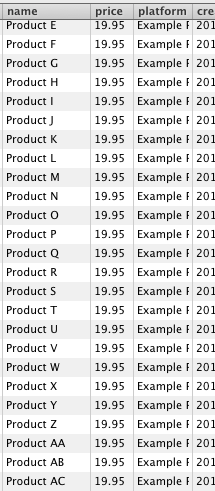 I was trying to use this in a factorygirl class to create test data with names like Product A, Product B etc. This isn’t very sophisticated. If you want some smarter dummy data generation with factorygirl, check out this post at the PMA media group.
I was trying to use this in a factorygirl class to create test data with names like Product A, Product B etc. This isn’t very sophisticated. If you want some smarter dummy data generation with factorygirl, check out this post at the PMA media group.
Anyway, here’s the pure ruby part if you fire up irb: ` i = 0 hash = Hash.new “a”.upto(“z”) do |letter| hash[i] = letter i+=1 end `
Gives you:
hash.sort
=> [[0, "a"], [1, "b"], [2, "c"], [3, "d"], [4, "e"], [5, "f"], [6, "g"], [7, "h"], [8, "i"], [9, "j"], [10, "k"], [11, "l"], [12, "m"], [13, "n"], [14, "o"], [15, "p"], [16, "q"], [17, "r"], [18, "s"], [19, "t"], [20, "u"], [21, "v"], [22, "w"], [23, "x"], [24, "y"], [25, "z"]]
Or even cleaner:
hash.sort.each {|k,v| print "#{v} "}
a b c d e f g h i j k l m n o p q r s t u v w x y z
It has an off-by-one problem for readability. You actually need to change the i=0 to i=1 for factory girl because the factorygirl sequence starts on 1. Here’s my factorygirl product class:
`# let’s make an alphabet. i = 1 hash = Hash.new “A”.upto(“Z”) do |letter| hash[i] = letter i+=1 end
Factory.define :product do |p| p.sequence(:name) { |n| “Product #{hash[n]}” } p.price 19.95 p.platform “Example Platform” end `
If you need more than 26 products, just change the upto(“Z”) to “ZZ” or whatever. It’ll scale as far as you want. If you need infinite scaling, don’t use letters. :)
To test, in the console: `script/console test
40.times { Factory(:product) } `
And this will generate some madness as depicted in the screenshot to the right.